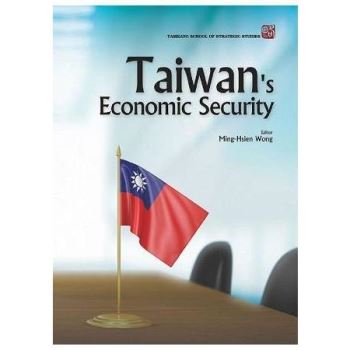Economic Interdependence and Taiwan’s Economic Security Strategy
Rong-I Wu
I. Preface
In the 1980s, the global economy liberalized at a rapid pace, deepening mutual interdependence in the world economy. Not only did international trade in goods grow very fast, the massive capital circulation was even more astounding. Deeper economic interdependence means that the movement of goods or capital among countries leads to mutual influence and mutual impact. This phenomenon of interdependence has both positive and negative repercussions. In other words, economic growth in one country will boost imports and this import growth will lead to greater demand for exports from the country’s trade partners, fueling their economic growth in return. Massive capital movements have an even more serious impact on the financial system. While an influx of foreign funds benefits capital formation, the opposite has a detrimental effect. When goods or money move around rapidly, destabilizing the macroeconomic environment, this affects the economic security of nations around the world. The same goes for overdependence on a specific commodity in international trade such as when crude oil accounts for an excessive share of a country’s exports or when a country over-relies on a single nation for its export markets because it will be vulnerable to economic downturns in the said export market. Similarly, massive capital movements can jeopardize the financial stability of a country or region, if not the entire world.The Asian financial crisis 1997-98 and the sub-prime mortgage crisis in the United States 2007-08 are two notable cases in point. This article aims to use the historic experience of the 1997-98 Asian financial crisis to illustrate the impact that the massive shifting of capital flows had for several Asian countries and how it escalated into the Asian financial crisis due to contagion effects. In order to prevent future financial crises it takes mutual cooperation and the establishment of a currency swap mechanism for mutual support. Due to the particularities of economic interdependence, participation and cooperation must be non-exclusive or else “contagion effects” will spread a crisis to the whole region.1 Taiwan is not able to participate in regional cooperation because China obstructs such moves. As a result, another financial crisis is likely. Similarly, since China uses its great power status to rule out Taiwan’s participation in any kind of regional or bilateral economic cooperation Taiwan’s economic security is affected. The focus of this article is to examine which economic security strategy Taiwan could adopt to cope with economic threats and to promote regional peace and economic growth. It will also propose certain policies to prevent future economic crises.
Rong-I Wu
I. Preface
In the 1980s, the global economy liberalized at a rapid pace, deepening mutual interdependence in the world economy. Not only did international trade in goods grow very fast, the massive capital circulation was even more astounding. Deeper economic interdependence means that the movement of goods or capital among countries leads to mutual influence and mutual impact. This phenomenon of interdependence has both positive and negative repercussions. In other words, economic growth in one country will boost imports and this import growth will lead to greater demand for exports from the country’s trade partners, fueling their economic growth in return. Massive capital movements have an even more serious impact on the financial system. While an influx of foreign funds benefits capital formation, the opposite has a detrimental effect. When goods or money move around rapidly, destabilizing the macroeconomic environment, this affects the economic security of nations around the world. The same goes for overdependence on a specific commodity in international trade such as when crude oil accounts for an excessive share of a country’s exports or when a country over-relies on a single nation for its export markets because it will be vulnerable to economic downturns in the said export market. Similarly, massive capital movements can jeopardize the financial stability of a country or region, if not the entire world.The Asian financial crisis 1997-98 and the sub-prime mortgage crisis in the United States 2007-08 are two notable cases in point. This article aims to use the historic experience of the 1997-98 Asian financial crisis to illustrate the impact that the massive shifting of capital flows had for several Asian countries and how it escalated into the Asian financial crisis due to contagion effects. In order to prevent future financial crises it takes mutual cooperation and the establishment of a currency swap mechanism for mutual support. Due to the particularities of economic interdependence, participation and cooperation must be non-exclusive or else “contagion effects” will spread a crisis to the whole region.1 Taiwan is not able to participate in regional cooperation because China obstructs such moves. As a result, another financial crisis is likely. Similarly, since China uses its great power status to rule out Taiwan’s participation in any kind of regional or bilateral economic cooperation Taiwan’s economic security is affected. The focus of this article is to examine which economic security strategy Taiwan could adopt to cope with economic threats and to promote regional peace and economic growth. It will also propose certain policies to prevent future economic crises.


